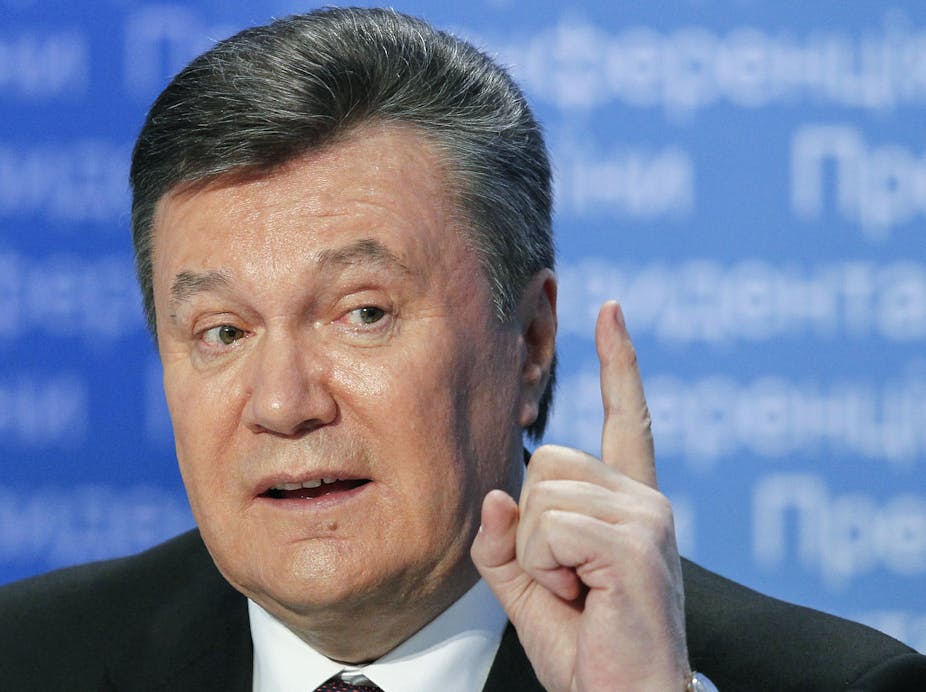The situation in Ukraine remains tense, yet the odds are that it will now stabilise. It is unlikely Russia will invade eastern Ukraine, both because it is unclear whether this was in the plans (if such plans ever existed) and because the West has reacted and raised the stakes.
It seems the current stand-off could linger as we approach the May elections. The time maybe ripe to examine how we arrived at this state of affairs. Clearly, it was not by design.
This crisis has deep roots, but the most crucial mistakes, misunderstandings, errors, blunders and bloomers have been committed in the last four months. Below I expand on what I believe have been the seven most consequential mistakes thus far in increasing (not chronological) order of importance.
Mistake 1: Yanukovych takes sick leave
A decisive moment is when Yanukovych takes sick leave. Western readers will be tempted to stop reading now, but that will not be the effect on those familiar with Ukraine, the Soviet Union and the transition from communism. Leaders in the Soviet Union took sick leave but this was not like in the West; this had meaning. It meant a crucial moment was at hand. It meant a political leader had two very difficult options to choose from, and that a choice will be made, soon. When Yanukovych announced he was sick, the Maidan took cover. When he returned and vacillated, he knew his days were numbered. This is one of Yanukovych’s three main mistakes. His indecision made a broad and inclusive governing coalition a practical impossibility but, on the positive side, it accelerated his departure.
Mistake 2: The West’s hesitant reaction to Crimea
When Russia annexed Crimea it took a few days and resulted in few casualties. The reaction from the West has so far been essentially what Russia expected. Russia was sure there would be costs, but it was also sure there would be no military retaliation. Russia counts on inaction thanks to its oligarchs in the UK, French warships, and gas and oil exports to Germany and Italy. The mistake here lies with the West. A military reaction was never expected, but the reaction should have been swift and severe, and most importantly, it should have surprised the Russians. This did not happen, and so Crimea is now Russia. If sanctions can be designed such as that they are finely targeted and finance- rather than trade-based, they can prove an effective tool.
Mistake 3: US interferes with opposition
A conversation purportedly between two senior American diplomats, recorded from an apparently secure line, was posted on YouTube in early February. The quality of the recording is astonishing. Even more so is what was said. Press coverage focused on the “expletive the EU,” comment, but the truly damaging remarks were those which cast doubt on the abilities of opposition leader Vladimir Klitschko and implied a heavy US hand behind the scenes. There is much about this that we will never know, but what we know about the type, level and timing of such interference is grave. It would be understandable if the opposition had rejected overtures from Yanukovych in January on its own terms. The tape strongly suggests this was not entirely the case.
Mistake 4: Opposition rejects Yanukovych’s joint government offer
Protests continued to escalate and in late January Yanukovych offered the post of prime minister to opposition leader Arsenij Yatseniuk and that of deputy prime minister to Klitschko. This was to be a grand compromise: at the time, it would have been judged as victory for the opposition, but it would also have preserved Yanukovych. The opposition rejected the offer. The main reason given by opposition leaders was that their demands were not met. The one unmet demand opposition leaders disclosed was early presidential elections.
Mistake 5: Snipers authorised to shoot to kill
More than two weeks after returning from sick leave, Yanukovych or someone very senior in his team authorises marksmen to shoot at protestors in downtown Kiev. All evidence suggests that the order was to shoot to kill. February 20 became one of the bloodiest days in Ukrainian history. Yanukovych looses the little remaining support he had, signs an agreement with the opposition on February 21, and leaves the country a day later.
Mistake 6: EU overestimates Association Agreements
For the last five years, Moldova, Georgia, Armenia and Ukraine were involved in delicate and intense negotiations about their EU Association Agreements (including Deep and Comprehensive Free Trade Agreements). During these negotiations, the EU failed to recognise that Ukraine was the pivotal country in this group and that its economic situation was becoming more precarious. In short, the EU overstimated the attractiveness of its Association Agreements. Throughout 2013, it did not believe the agreement should be accompanied by significant economic support. This was only rectified earlier this month. By itself foreign aid in the short- or medium-term is unlikely to succeed; Ukraine needs deep reform.
Mistake 7: Yanukovych at the last minute reneges on EU Association Agreement
The most important mistake in this crisis was Yanukovych’s decision not to sign the Association Agreement with the European Union. This was what you might call a very calculated mistake. The way it was handled resulted in Yanukovych rapidly losing the relatively little international support and credibility he enjoyed, from Russia as well as from the EU. The Yanukovych government stalled negotiations and repeatedly declared that the agreement would be signed, until the very last minute. The refusal to sign the Association Agreement and the cynical way in which it occurred constitute the original sin for the current Ukranian crisis.
Mistake 8: In a chaotic crisis like this, mistake number 8 is most likely round the next corner…

